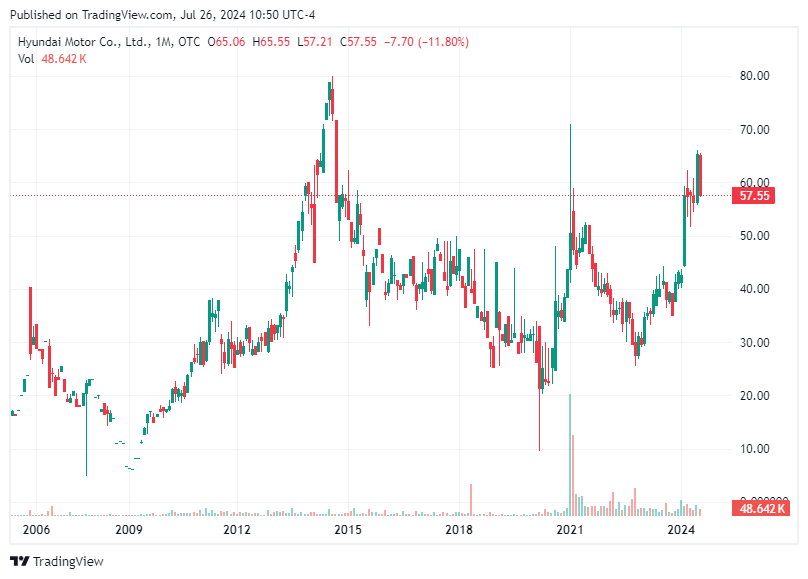Hyundai Reports 25% Profit Increase
Hyundai Motor Sees 25% Profit Increase Driven by Strong U.S. Sales.

Disclaimer: The following article is for informational purposes only and does not constitute financial advice. The figures and information presented are based on the latest available data as of July 2024.
Real-time information is available daily at https://stockregion.net
Hyundai Motor, a prominent South Korean automaker, has reported a 25% increase in profit for the second quarter of the current fiscal year. This surge in profitability has been largely attributed to robust vehicle sales in the United States, which have effectively counterbalanced weaker demand in the company's home market of South Korea and other regions. This article will provide a detailed analysis of Hyundai Motor's recent financial performance, focusing on the factors contributing to its growth and the challenges it faces moving forward.
Financial Performance Overview
For the quarter ended June 2024, Hyundai Motor reported a net profit of 4.174 trillion won (approximately $3.02 billion), marking a notable 25% increase from the same period the previous year. This impressive result surpassed the FactSet-compiled consensus forecast of 3.488 trillion won. Revenue for the quarter rose by 6.6%, reaching 45.021 trillion won. Operating profit also achieved a record high, coming in at 4.279 trillion won.
The most contributor to Hyundai's profit surge was the strong performance in the U.S. market. North American wholesale car sales surged by 15% during the second quarter, driven by high demand for hybrid electric vehicles (HEVs) and sport-utility vehicles (SUVs). Despite a general slowdown in demand for pure electric vehicles (EVs), the U.S. market's appetite for hybrids and SUVs has remained robust, providing a substantial boost to the company's earnings.
The strength of the U.S. dollar against the South Korean won played a crucial role in enhancing Hyundai's profitability. A stronger dollar increases the value of revenue earned in the U.S. when converted back to won, thus positively impacting the overall financial performance.
Challenges in Domestic and Other Markets
While Hyundai Motor experienced strong sales in the U.S., it faced challenges in its home market of South Korea and other international markets. Overall global wholesale car sales fell by 0.2% during the quarter, with South Korean wholesale car sales plummeting by 9.6%. In South Korea, economic uncertainties and changing consumer preferences have led to a slowdown in vehicle demand. However, Hyundai Motor remains optimistic about the long-term potential of environmentally friendly vehicles, particularly hybrids and pure EVs, to drive future growth.
Hyundai Motor's focus on a balanced portfolio of hybrid and electric vehicles has proven to be a key differentiator in the competitive automotive landscape. The company has successfully navigated the recent slowdown in demand for pure EVs by emphasizing the development and promotion of hybrid models, which have garnered strong interest from consumers. The company expects continued strong demand for hybrid cars in the near term. This optimism is based on the growing awareness of environmental concerns among consumers and the increasing availability of hybrid models that offer a compelling combination of fuel efficiency and performance.
Hyundai Motor plans to launch new Ioniq EV models in the second half of 2024. The Ioniq brand is a cornerstone of Hyundai's electric vehicle strategy, and the introduction of new models is expected to enhance the company's competitive position in the EV market. Additionally, Hyundai intends to upgrade its popular Santa Fe and Tucson SUVs, further diversifying its hybrid and pure EV lineup.
Competitive Landscape and Market Outlook
Hyundai Motor operates in a highly competitive industry, facing intense competition from both traditional automakers and new entrants focused on electric vehicles. Despite these challenges, analysts have praised Hyundai's approach to managing the evolving market dynamics. By offering a diverse range of products, including hybrids, pure EVs, and high-end SUVs, Hyundai has positioned itself to capture a broad spectrum of consumer preferences.
The company's ability to adapt to changing market conditions and consumer demands has been a key factor in its recent success. For instance, Hyundai's emphasis on hybrid vehicles has allowed it to mitigate the impact of slower pure EV sales while continuing to capitalize on the growing trend towards environmentally friendly transportation.
Shares of Hyundai Motor have reflected investor confidence in the company's strategy and performance, rising roughly 25% over the course of the year. This upward trend in share price indicates positive market sentiment and expectations for continued growth. Hyundai Motor's remarkable 25% profit increase in the second quarter of 2024 shows the company's resilience and acumen in navigating a complex and competitive automotive market. Strong sales in the U.S., driven by demand for hybrid and SUV models, have been instrumental in offsetting weaker performance in other regions.
As Hyundai Motor continues to innovate and expand its product offerings, particularly in the realm of hybrid and electric vehicles, it is well-positioned to capitalize on emerging trends and maintain its competitive edge. The company's proactive approach to market challenges and commitment to sustainability will likely play a pivotal role in shaping its future success.
Disclaimer: This article is intended for informational purposes only and should not be construed as financial advice. The opinions and information presented are based on the latest available data as of July 2024.
Real-time information is available daily at https://stockregion.net


